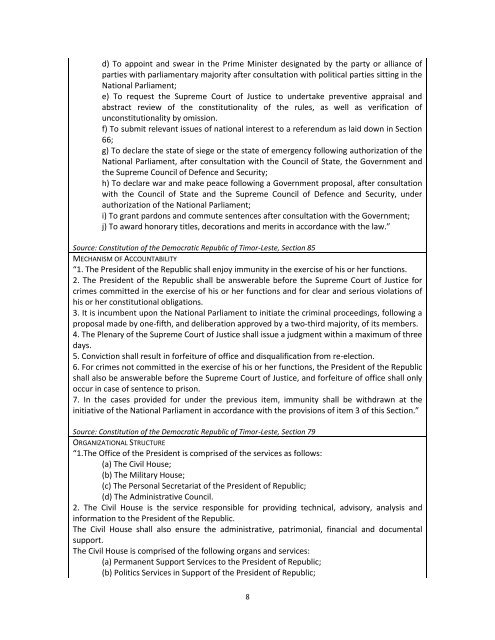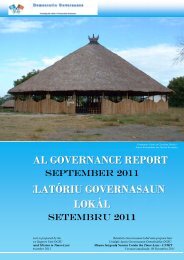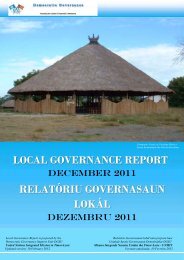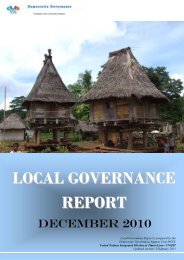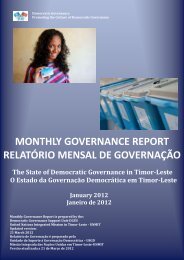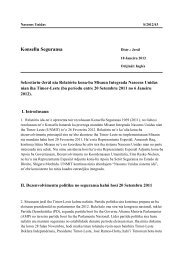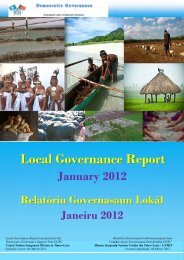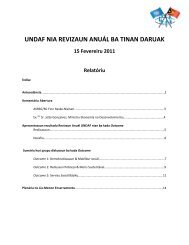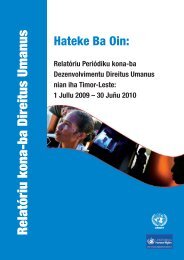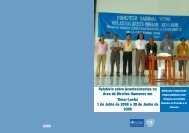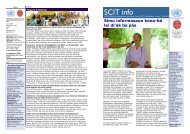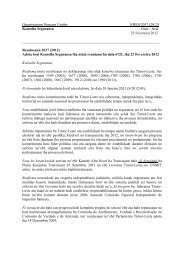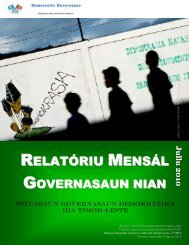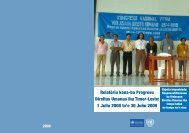Key Institutions Report final 15 December 2011 - Unmit
Key Institutions Report final 15 December 2011 - Unmit
Key Institutions Report final 15 December 2011 - Unmit
You also want an ePaper? Increase the reach of your titles
YUMPU automatically turns print PDFs into web optimized ePapers that Google loves.
d) To appoint and swear in the Prime Minister designated by the party or alliance of<br />
parties with parliamentary majority after consultation with political parties sitting in the<br />
National Parliament;<br />
e) To request the Supreme Court of Justice to undertake preventive appraisal and<br />
abstract review of the constitutionality of the rules, as well as verification of<br />
unconstitutionality by omission.<br />
f) To submit relevant issues of national interest to a referendum as laid down in Section<br />
66;<br />
g) To declare the state of siege or the state of emergency following authorization of the<br />
National Parliament, after consultation with the Council of State, the Government and<br />
the Supreme Council of Defence and Security;<br />
h) To declare war and make peace following a Government proposal, after consultation<br />
with the Council of State and the Supreme Council of Defence and Security, under<br />
authorization of the National Parliament;<br />
i) To grant pardons and commute sentences after consultation with the Government;<br />
j) To award honorary titles, decorations and merits in accordance with the law.”<br />
Source: Constitution of the Democratic Republic of Timor-Leste, Section 85<br />
MECHANISM OF ACCOUNTABILITY<br />
“1. The President of the Republic shall enjoy immunity in the exercise of his or her functions.<br />
2. The President of the Republic shall be answerable before the Supreme Court of Justice for<br />
crimes committed in the exercise of his or her functions and for clear and serious violations of<br />
his or her constitutional obligations.<br />
3. It is incumbent upon the National Parliament to initiate the criminal proceedings, following a<br />
proposal made by one-fifth, and deliberation approved by a two-third majority, of its members.<br />
4. The Plenary of the Supreme Court of Justice shall issue a judgment within a maximum of three<br />
days.<br />
5. Conviction shall result in forfeiture of office and disqualification from re-election.<br />
6. For crimes not committed in the exercise of his or her functions, the President of the Republic<br />
shall also be answerable before the Supreme Court of Justice, and forfeiture of office shall only<br />
occur in case of sentence to prison.<br />
7. In the cases provided for under the previous item, immunity shall be withdrawn at the<br />
initiative of the National Parliament in accordance with the provisions of item 3 of this Section.”<br />
Source: Constitution of the Democratic Republic of Timor-Leste, Section 79<br />
ORGANIZATIONAL STRUCTURE<br />
“1.The Office of the President is comprised of the services as follows:<br />
(a) The Civil House;<br />
(b) The Military House;<br />
(c) The Personal Secretariat of the President of Republic;<br />
(d) The Administrative Council.<br />
2. The Civil House is the service responsible for providing technical, advisory, analysis and<br />
information to the President of the Republic.<br />
The Civil House shall also ensure the administrative, patrimonial, financial and documental<br />
support.<br />
The Civil House is comprised of the following organs and services:<br />
(a) Permanent Support Services to the President of Republic;<br />
(b) Politics Services in Support of the President of Republic;<br />
8


